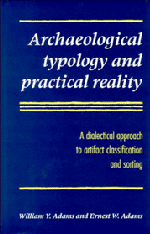 Archaeological Typology and Practical Reality
Archaeological Typology and Practical Reality Book contents
- Frontmatter
- Contents
- List of figures
- List of tables
- The archaeologist's preface
- The philosopher's preface
- PART I Introductory
- PART II The nature of types and typologies
- 3 Dimensions and elements of “typehood”
- 4 Perceptual and conceptual foundations
- 5 The dialectics of type formulation
- 6 The nature of types
- 7 The structure of typologies
- 8 A synthetic definition of typology and type
- PART III Typology in action: the Medieval Nubian Pottery Typology
- PART IV Pragmatics of archaeological typology
- PART V Classification, explanation, and theory
- Appendices
- References
- Index
6 - The nature of types
Published online by Cambridge University Press: 23 November 2009
- Frontmatter
- Contents
- List of figures
- List of tables
- The archaeologist's preface
- The philosopher's preface
- PART I Introductory
- PART II The nature of types and typologies
- 3 Dimensions and elements of “typehood”
- 4 Perceptual and conceptual foundations
- 5 The dialectics of type formulation
- 6 The nature of types
- 7 The structure of typologies
- 8 A synthetic definition of typology and type
- PART III Typology in action: the Medieval Nubian Pottery Typology
- PART IV Pragmatics of archaeological typology
- PART V Classification, explanation, and theory
- Appendices
- References
- Index
Summary
In the last chapter we saw how types come into being. Here we will consider more fully what their properties are, once they have been formulated. It should be evident from the previous discussion that they are among the most complex of all human mental constructs (cf. Jevons 1874, II: 425–6); so much so that it is often impossible to give them precise or rigorous definition (cf. Simpson 1945: 15–16; Vygotsky 1962: 79).
A preliminary note on terminology
The processes of type formation that we described in the last chapter are in the broadest sense processes of definition. Yet, as we will see presently, archaeological types are almost never defined in the rigorous or formal way required by philosophers and logicians. Consequently, we must be careful in our use of the terms “define” and “definition” in the present work.
We will speak of a type as being defined by certain attributes, if and only if the possession of those attributes is both a necessary and a sufficient condition for the existence of the type. We will say that a definition is a recognized or unrecognized aspect, or component, of every type, in the sense that every type must necessarily have a unique combination of features (diagnostic attributes) that is potentially capable of formal definition. To avoid terminological confusion, we will refer to the process of consciously formulating or expressing a definition as defining.
- Type
- Chapter
- Information
- Archaeological Typology and Practical RealityA Dialectical Approach to Artifact Classification and Sorting, pp. 63 - 75Publisher: Cambridge University PressPrint publication year: 1991


